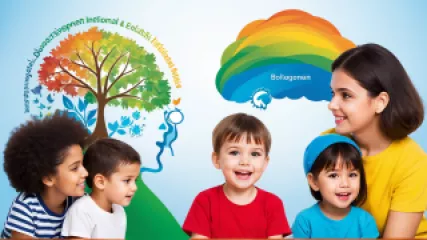Understanding Cognitive Development in Children
Understanding Cognitive Development in Children
Cognitive development refers to the process through which children acquire knowledge, develop problem-solving skills, and understand their surroundings. It encompasses various aspects of mental abilities, including perception, attention, memory, language, and thinking. As children grow and experience the world around them, their cognitive abilities evolve, leading to significant advancements in their understanding and reasoning. In this research summary, we will explore the stages of cognitive development in children and the factors that influence their cognitive growth.
The Stages of Cognitive Development
Psychologist Jean Piaget proposed a theory of cognitive development that outlines four distinct stages that children go through as they develop their cognitive abilities:
- Sensorimotor Stage (Birth to 2 years): During this stage, infants learn about the world through their senses and motor actions. They develop object permanence, the understanding that objects continue to exist even when out of sight. They also begin to engage in simple problem-solving and imitation.
- Preoperational Stage (2 to 7 years): In this stage, children start using symbols, such as words and images, to represent objects and events. They engage in pretend play and exhibit egocentric thinking, where they struggle to take the perspective of others. Their thinking is primarily concrete and lacks logical reasoning.
- Concrete Operational Stage (7 to 11 years): At this stage, children develop more logical thinking abilities. They can understand conservation, the idea that certain properties of objects remain the same despite changes in appearance. They also become better at classifying objects into different categories.
- Formal Operational Stage (11 years and older): During this stage, adolescents and adults demonstrate abstract thinking and hypothetical reasoning. They can think about possibilities and engage in complex problem-solving. They also develop metacognitive skills, allowing them to reflect on their own thinking processes.
It is important to note that children progress through these stages at different rates, and individual differences exist in their cognitive development.
Factors Influencing Cognitive Development
Several factors contribute to a child's cognitive development:
- Biological Factors: Genetic factors play a significant role in cognitive development. Children inherit certain cognitive abilities and predispositions from their parents, which can influence their learning and problem-solving skills.
- Environmental Factors: The environment in which a child grows up greatly impacts their cognitive development. Rich and stimulating environments with opportunities for exploration and learning enhance cognitive growth. On the other hand, adverse experiences or a lack of stimulating environments can hinder cognitive development.
- Social Interactions: Interactions with caregivers, peers, and other individuals significantly shape a child's cognitive development. Through social interactions, children learn language, problem-solving strategies, and cultural norms, which impact their cognitive abilities.
- Educational Experiences: Formal education provides structured learning opportunities that promote cognitive growth. Classroom settings, educational programs, and teaching strategies all influence a child's cognitive development.
Implications for Mental Health Coaching
Understanding cognitive development in children has important implications for mental health coaching. By recognizing the different stages of cognitive development, mental health coaches can tailor their approaches to support children's unique needs. They can design interventions and activities that align with a child's cognitive abilities and promote their cognitive growth.
Mental health coaching programs can focus on enhancing cognitive skills such as problem-solving, critical thinking, and decision-making. These programs can also incorporate techniques to promote cognitive wellness, including mindfulness exercises, memory strategies, and attention-building activities. By addressing cognitive development within a mental health coaching context, coaches can contribute to the overall well-being and cognitive flourishing of children.
In conclusion, cognitive development in children is a complex and fascinating process that encompasses various aspects of mental abilities. Through the stages of sensorimotor, preoperational, concrete operational, and formal operational, children acquire new knowledge and skills, gradually advancing their cognitive abilities. Biological factors, environmental influences, social interactions, and educational experiences all play crucial roles in shaping a child's cognitive development. Mental health coaching programs can use this understanding to design interventions that promote cognitive growth and support children in their journey towards optimal cognitive health.






